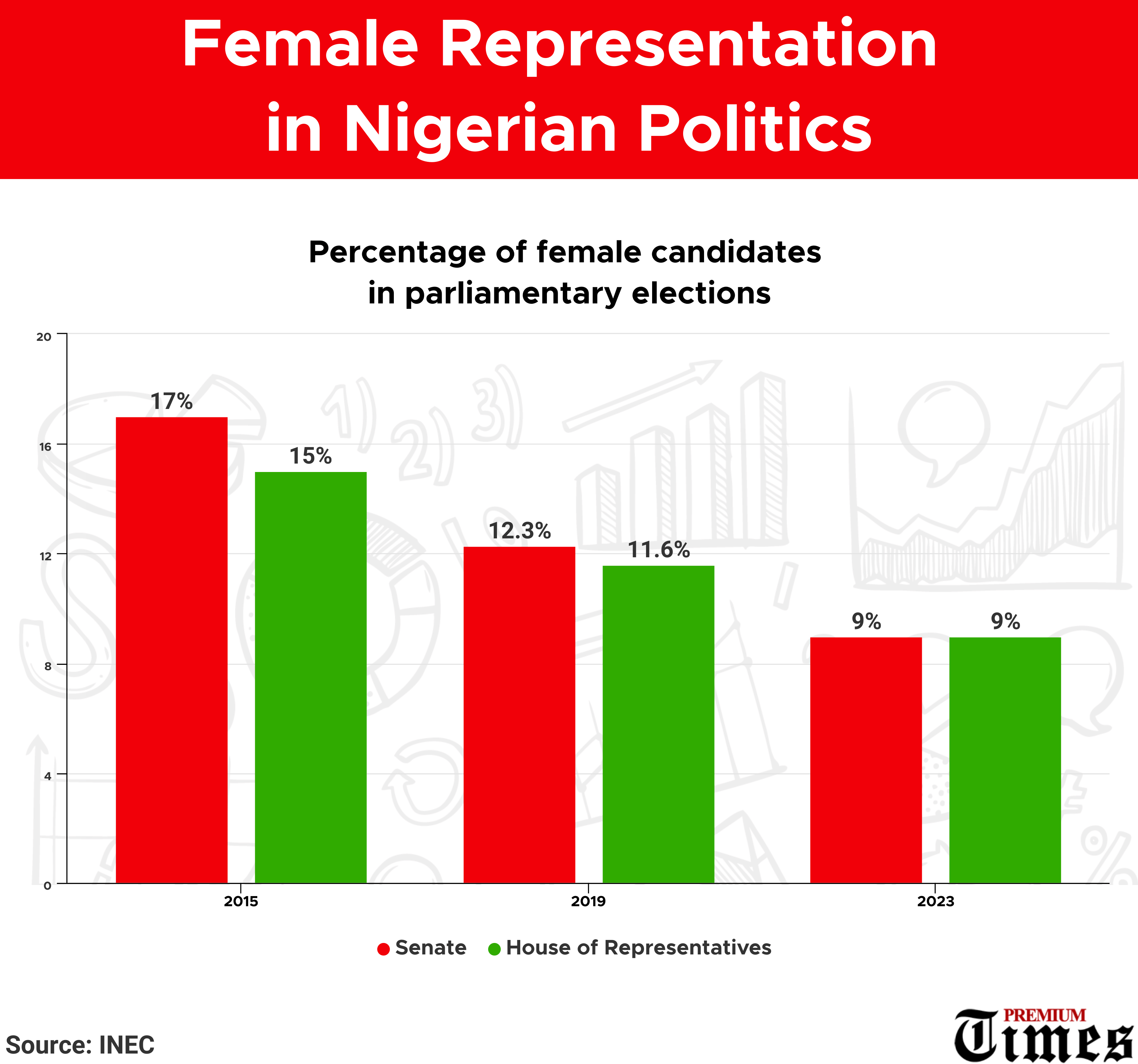Nigeria records very low participation of women in politics, despite making up over 50% of the country’scountry’s 216 million population.
While female participation in politics is generally low across the country, it is worse in the northern region, which has 19 states and a higher population than the south, which has 17 states.
Between 2015 and 2019, there were seven female senators in Nigeria out of a total of 109, while in the House of Representatives, the number of women was 22 (6.8%) out of 360 members and decreased to 11 in 2019.
Of the seven female senators between 2015 and 2019, six were from the south and only one from the North, Binta Garba. Six of the 11 female House of Representatives members were from the south, and five were from the north.
There has been advocacy by civil society groups to raise the level of female participation in politics to at least 30%, as stipulated in the Beijing Declaration during the Fourth International Conference on Women in 1885.
What deters women from contesting?
In southern Nigeria, women feel more free to participate in politics due to some fairly liberal cultures in the region. Still, several elements tied to the political systems and structures hinder many. For instance, women are discouraged from running for office due to the high expenses involved in politicking in a country where one’s ability to succeed politically is almost always tied to their economic influence.
The cost of nomination and declaration of interest forms that political parties require candidates to submit to run for seats on their platforms could run into tens of millions, depending on the position one is aspiring to.
And the cost of campaigning could be biting in a political system dominated by male money-bag politicians.
But there are more hindrances in Northern societies alongside finance and the political system. Up north, existing conservative practices limit females to mothers, sisters, daughters, and brides. That is partly because these cultural and religious structures portray women as inferior to men.
The region has a highly prevalent practice of child marriage, preventing girls from receiving a western education. Having no access to schooling limits their understanding of the importance of women’s political participation.
According to UNICEF’s most recent data, girls who marry young are less likely to continue their education, and 87% of married adolescent girls are not in school (UNICEF).
Lack of education also equals a lack of access to meaningful employment and general economic success. Women in the north are also less likely to afford to participate massively in obtaining leadership positions due to unpaid labour responsibilities, unequal inheritance rights, and open discrimination.
2023 election reviewed
While about 92 women aspired to be senators during the February 25 national assembly election, only three—representing 8.4%l—won their place into the 109-member senate. And none of them is from Northern Nigeria.
Also, out of 15 women who won the House of Representatives seat, only four came from Northern.
“The issue about the low participation of women in politics from the Northern part of Nigeria is because of the high level of unlettered people in the region, insecurity, and the poverty rate,” Abdullahi Muhammadu, a political analyst, said.
“The only way women may succeed is for the elite women who are actively advocating for women’s participation in politics all over the region to come together and organize crucial training for women in the grassroots to understand why they need to be part of policy-making so that they would be known.”
Months before the 2023 general elections, women fighting gender-balanced political participation held several rallies across the county, canvassing for support for female politicians. But Muhammadu said the change has to start with women supporting women.
“Since half of Nigeria’s population is women, if they engage together – it might work. For instance, the only female presidential candidate in the election, Chichi Ojei of the Allied People’sPeople’s Movement, secured only 25,961 votes from the 24,025,940 valid votes cast,” he said
“After INEC closed registration for voters’ cards, it said there are more [additional] registered women voters, 3.29 million, than registered male voters, 3.3 million. Imagine if this highest number of women voted for the female candidate. Do you think she won’t emerge?”
Nigeria experiences low female participation in politics despite women comprising over half of its 216 million population. This issue is especially acute in the northern region, known for its conservative practices and higher population compared to the south. From 2015 to 2019, there were only 7 female senators out of 109, with most from the south. Female representation in the House of Representatives dropped from 22 (6.8%) out of 360 members to 11 in 2019, with a similar regional distribution.
Efforts by civil society advocate for at least 30% female political representation, in line with the Beijing Declaration. However, financial burdens, including high costs for nomination forms and campaigns, discourage women from running. Northern Nigeria faces additional cultural and religious barriers, such as conservative roles for women and high rates of child marriage, limiting girls' education and political awareness. UNICEF reports that 87% of married adolescent girls are out of school.
In the recent 2023 elections, only 3 out of 92 female senatorial aspirants succeeded, and none were from the north. Similarly, only four of the fifteen female House of Representatives winners hailed from Northern Nigeria. Political analyst Abdullahi Muhammadu cites high illiteracy, insecurity, and poverty as significant deterrents. He suggests that grassroots training by elite women could raise awareness and support for female political participation.
Before the 2023 elections, numerous rallies sought gender-balanced political participation, but sustainable change requires solidarity among women. Abdullahi points out that the only female presidential candidate, Chichi Ojei, received very few votes compared to the overall count, emphasizing the potential impact if more women voted in support of female candidates.






